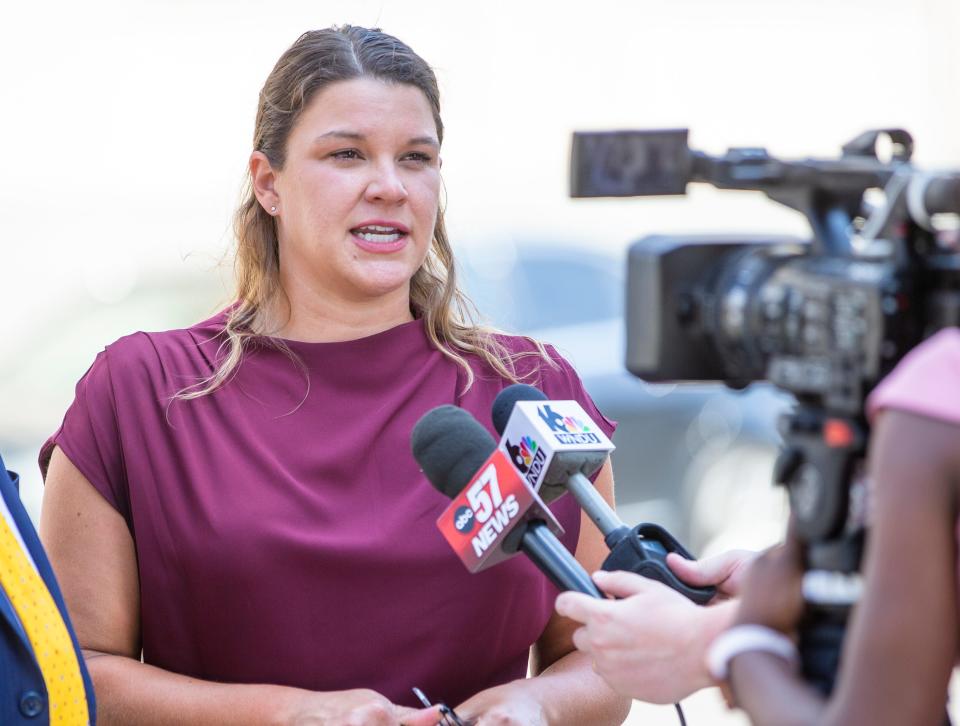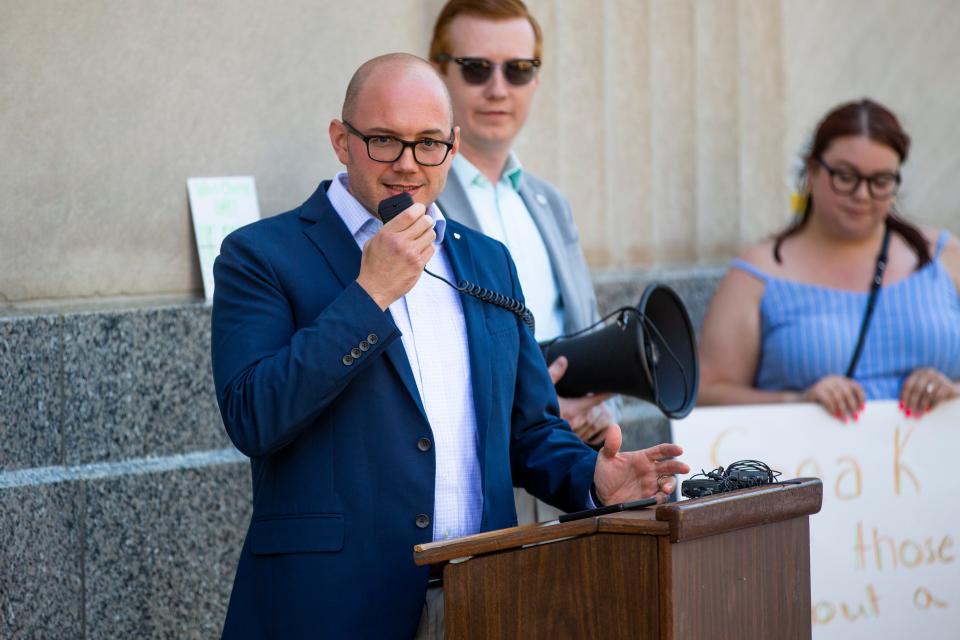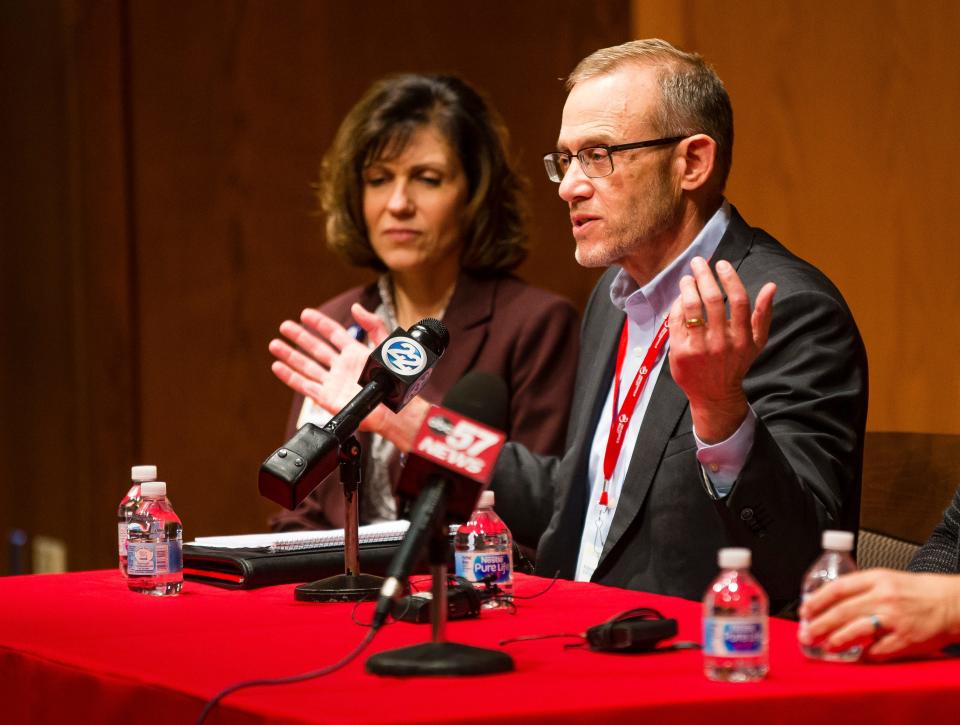St. Joe County health officer: 'More dead women' without exemptions to abortion ban
Pleas from St. Joseph County health officials to include key exceptions in a law banning abortion seem likely to be met by Republican state lawmakers. While local health officials say this policy will prevent deaths, they also point to evidence showing that states with more abortion restrictions consistently report poorer health outcomes for mothers and children.
The lobbying comes ahead of legislators convening Monday for a session ending Aug. 14 in which Republicans plan a near total ban on abortion. Senate Republicans presented a bill this week that would ban abortion in all cases except for when rape or incest has occurred or when "a substantial impairment to the life of the mother" is imminent.
A letter endorsed by four doctors who lead the county health department and the related county Board of Health was sent to all nine of the state representatives and senators in the county. Leaders called for pregnant people to maintain the right to choose in "exceptional circumstances" or else worsen the state's health outcomes. The statement also said Indiana "lack[s] the presence of strong policies to support family health and well-being and economic stability, especially for families with low incomes."
“There’s this kind of paradox: The states that have the most abortion restrictions also tend to have the worst maternal mortality and infant mortality," said Sally Dixon, who oversees maternal and infant health initiatives at the St. Joseph County Department of Health. "And that’s a function of that focus on restricting abortion rather than focusing on the kinds of policies that support pregnancy, family and well-being.”
Indiana would become one of eight states to ban most abortions at zero weeks, according to the Guttmacher Institute. Current law allows abortions up to 22 weeks after conception. Emergency contraception such as Plan B would be allowed under the new proposal, as would terminating pregnancies in which the fetus suffers a fatal fetal abnormality.
"Senate Bill 1 bans women from making their health care decisions ... ," said State Rep. Maureen Bauer, a Democrat representing downtown South Bend and nearby neighborhoods. "I was a bit shocked to see that extreme proposal introduced ignoring the fact that many women who seek out (an abortion) do so in the first trimester of pregnancy,” which spans 12 weeks.

The bill remains subject to change in the State Senate and the State House, where Republicans hold supermajorities. The main debates left to be had among conservatives are whether to omit any exemptions and whether to alter enforcement of the law.
Indiana Right to Life, an influential anti-abortion organization with local chapters such as Michiana Right to Life, is already pushing for stauncher restrictions on enforcing the proposed abortion ban. Calling the bill "weak and troubling," the group said in a statement Friday that it wants to see clearer criminal consequences for physicians who skirt an abortion ban.
The law would not criminalize people seeking an abortion, but doctors who perform them illegally could lose their license. And under the Senate bill, physicians are responsible for making a "reasonable medical judgment" about impairments to the life of the mother and whether rape or incest occurred. Victims of rape or incest seeking an abortion would not have to file a police report, but they would need to sign an affidavit. Doctors may consider affidavits, but no criminal charges or convictions are necessary.
More:'We’re going to keep on keeping on:' South Bend abortion clinic will remain open for now
Where local lawmakers stand
Bauer said she expects many Republican lawmakers in the House to push for a stricter ban.
Republican State Reps. Jake Teshka and Timothy Wesco, who together represent much of St. Joseph County, have both said in social media posts they personally support an exception only for the life of the mother. Wesco said on Facebook Tuesday that "life is too sacred" to make other exceptions in the case of rape or incest, comparing such exceptions to a policy allowing assisted suicide for people who are terminally ill or in chronic pain.

Other St. Joseph County Republican legislators did not agree to interview requests made through spokespersons. Republican state representative Dale DeVon joins Teshka and Wesco in opposing abortion, though whether he favors exceptions for rape and incest is unclear.
Republican senators Mike Bohacek, Ryan Mishler and Linda Rogers represent the county in the State Senate. Speaking to a LaPorte County radio station last week, Bohacek said he supports exceptions for "rape, incest and the health of the mother," explaining that a mother should be allowed to make a decision about her health before her life is in danger.
Speaking before the Senate Republicans' bill was made public, county Health Officer Robert Einterz turned grave when predicting what he believes would happen if key exemptions don't make it into the new Indiana laws governing abortion access, which are likely to take effect Sept. 1.
“The bottom line is you’d see more dead women," Einterz said, as Dixon sat by, silently nodding.
"You'd have more mental illness," he added. "You would have more stress-related morbidity. You'd have more family disruption. You would have more suicides. That's what I would expect would happen if these exemptions are not allowed."
Health officials warn of consequences
The Senate proposal preserves Indiana's current exemptions for cases in which the life of the mother is at risk, where rape or incest has occurred and when doctors diagnose a lethal fetal abnormality.
But in their letter, local health officials cite evidence showing that Indiana consistently ranks among the 10 worst states for maternal and infant mortality. While the state has further restricted abortion access, officials say it has failed to adequately support families with key social services.

“The motivation was really very simple: We have an obligation to promote and nurture the health of mothers and children and, for that matter, all individuals within the county," said Einterz, who endorsed the letter with Deputy Health Officer Mark Fox, Board of Health President Heidi Beidinger-Burnett, and Board of Health Vice President Jason Marker.
Dixon said she wanted lawmakers to know that abortion is broader than someone merely choosing not to have a child. When a mother's life is endangered in the hospital, medication or surgery to terminate the pregnancy is legally an abortion.
"For some people, their understanding of abortion is that that’s just something that’s done when someone doesn’t want to have a baby," Dixon said. "But the definition of abortion is termination of pregnancy. It doesn’t mean a certain method of doing that."
The letter cites research from earlier this year showing how states with the highest number of abortion restrictions report poorer maternal and child health outcomes. Data from recent years shows that only eight states have higher infant mortality rates than Indiana. Indiana's maternal mortality rate is the worst in the Midwest and among the highest in the nation.
More:South Bend's lone abortion clinic had plans to expand. It may not have enough time.
In response to the grim data, the health department also recommends that lawmakers consider a host of policies — such as workplace protections for pregnant workers, paid time off for reproductive health care and paid family leave — designed to improve the health outcomes of Hoosier mothers and their children.
Senate Republicans proposed a related bill this week that would create the Hoosier Families First Fund and allot $45 million to support programs that promote the health of mothers and babies, address barriers to birth control and increase access to child care. An additional $5 million would be used to promote adoption.
Bauer said she and other Democratic lawmakers likely won't make headway on loosening the abortion ban. But their focus will be to introduce labor policies that benefit mothers and to protect entities that provide reproductive care, even if they can no longer provide abortions.
After Senate Republicans revealed their proposal Wednesday, Dixon declined to say outright whether an almost complete ban on abortion is bad public health policy.
But she warned of "unintended consequences" when legislating health care. If doctors wait too long to provide life-saving care because they're unsure of the threshold for a "substantial medical impairment," severe ailments or deaths could result.
“I’m very aware — I think we all are — that people have varying understandings, interpretations and beliefs about abortion," Dixon said. "Which is why we chose to focus on what we know will endanger women’s and girls’ lives.”
Email South Bend Tribune city reporter Jordan Smith at JTsmith@gannett.com. Follow him on Twitter: @jordantsmith09
This article originally appeared on South Bend Tribune: 'More dead women' probable without exemptions to Indiana abortion ban

